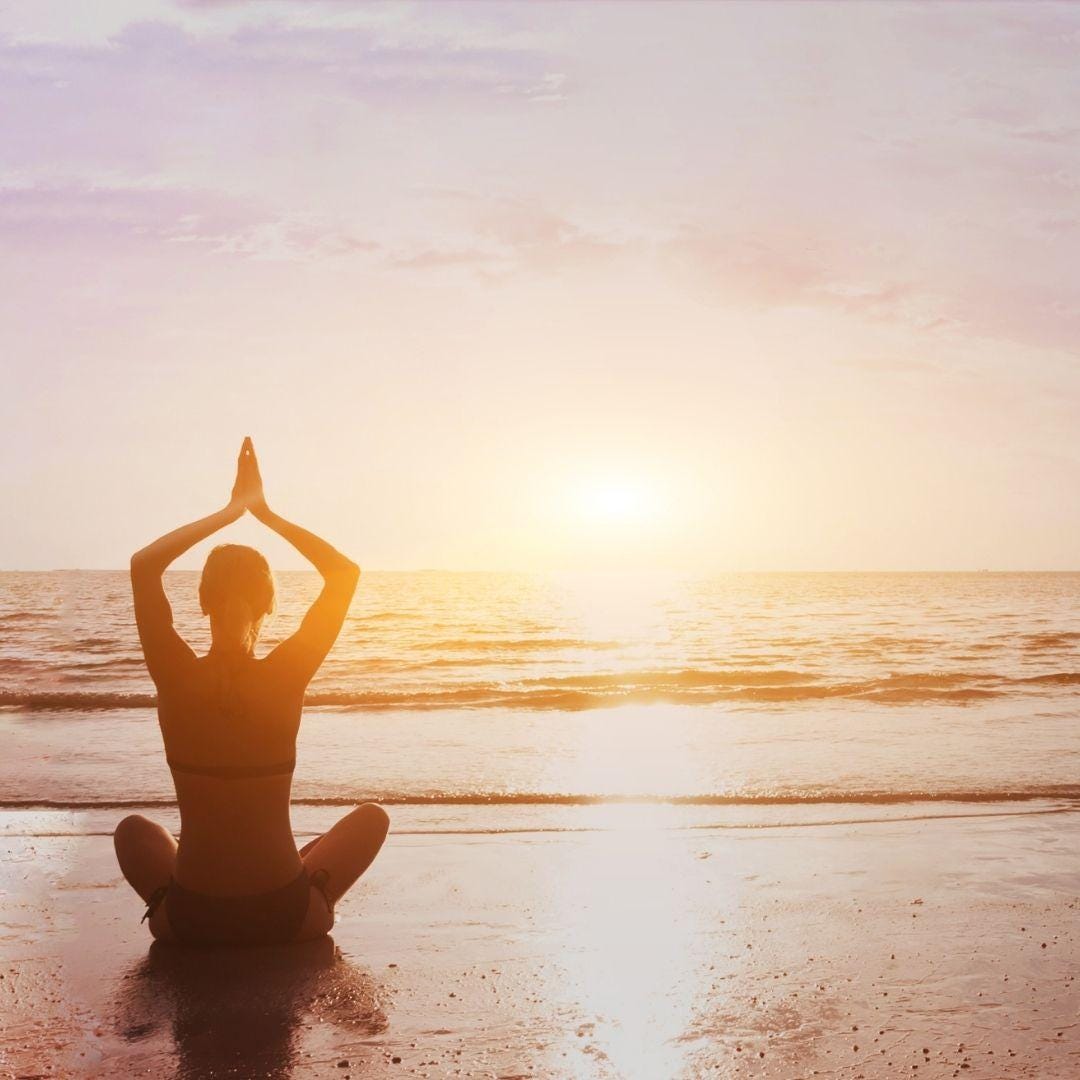Welcome back to HOT FLASH!, your source for the knowledge you need to take control of your health and wellbeing and THRIVE during menopause!
By reading the following, you agree to the terms set forth in the supplement disclaimer here.
At HOT FLASH! The Newsletter — and with every step of Changing with the Change — we talk a lot about mindset. Not in a "just think positive" way, but in a way that is curiosity-based, reality-rooted, open-to-opportunity, self-honoring. A positive menopause mindset means learning how to relate to your menopause experience with curiosity, clarity, compassion, appreciation — and perhaps, a little humor — even when the changes are loud, messy, or relentless. And this is exactly where mindfulness can play a key role.
Now, we know, if you’ve ever been told to "just relax" when you’re riding the wild waves of menopause, you know how deeply unhelpful that advice can feel. But what if...
...relaxation wasn’t the goal — awareness was?
...being present with the change was actually more helpful than resisting or "fixing" it?
Because here’s the truth:
To be at peace with yourself, you can't be at war with your body. Mindfulness offers a way to be a friend to both.
Today’s spotlight: brand-new research showing how mindfulness-based practices don’t just feel good — they can change your experience in menopause. By empowering you to meet physical, emotional, mental, and sexual changes with more presence and less panic, mindfulness practices can also improve those same changes.
It’s validation for what we’ve been saying all along:
Changing with the Change takes a powerful shift in mindset — and mindfulness-based practices can help you make and embody that shift.
Read on for more on:
How mindfulness and the menopause mindset relate (plus examples and resources!)
A summary of key findings from this week's featured research
Four key takeaways to get you started, your way, today
Mindfulness-based Practices and Your Menopause Mindset
Mindfulness isn’t about sitting on a cushion in perfect stillness. At its core, mindfulness means paying attention to your present moment experience with fresh eyes of openness, curiosity, and compassion. It helps you notice without judgment, consciously shift your inner state, and thoughtfully respond rather than react — even when hormones, hot flashes, or sleep disruptions feel beyond your control.
That’s what makes it such a powerful ally in menopause.
There are several ways to practice mindfulness; and they aren't one-size-fits-all. Take the opportunity to explore and find the one that works for you.
For example, our featured research this week systematically reviewed and analyzed studies that evaluated Mindfulness-based Interventions (MBIs) including:
Mindfulness-Based Stress Reduction (MBSR): Originally developed as a hospital-based stress reduction and relaxation program for patients, MBSR is a structured program combining mindfulness meditation and yoga designed to lower stress and enhance body awareness. For more on MBSR, here is a wonderful guide to MBSR and collection of resources and self-guided and instructor-led courses.
Mindfulness-Based Cognitive Therapy (MBCT): Like MBSR, MBCT combines the two proven strategies of 1) cognitive therapy - targeting recognition and shifting of unhelpful thought patterns - and 2) mindful meditation - aimed at cultivating self-awareness and -acceptance. Also, like MBSR, the combination has proven to be an effective duo. For more on MBCT, check out this guide to MBCT resources.
Body scan meditations: These meditations give you practice with mindfulness by guiding you through gentle attention to the body, helping you release tension and reconnect with physical sensation. Ready to try it? Join me in a 5-minute Body Scan meditation!
Breathwork and moment-to-moment awareness: There are a variety of quick, adaptable tools that can provide mindfulness practice during hot flashes, overwhelm, or simply a busy day. Interested in exploring one of our favorite tools? Request your Good Stress Visual Cue Cards!
What the practices above (and other MBIs) share is intentionality. They help you begin to consciously change your relationship to what’s happening externally and rewire how you unconsciously relate to it internally, which is the foundation of a strong menopause mindset.
Because when you change how you meet your experience, you change your experience.
That’s the shift. That’s the power. That’s mindfulness — made for midlife.
Our Featured Research: Key Findings
Our featured 2025 systematic review and meta-analysis tackled a huge question:
Can mindfulness-based interventions (MBIs) actually help with menopausal changes and create whole-person health?
To answer that question, the researchers analyzed 18 randomized controlled trials involving over 1,100 participants. Acknowledging that menopause is "a crucial transitioning stage" and that it "can significantly impact mood and wellbeing," they concluded that there is "support [for] using of MBI's to improve health outcomes in postmenopausal" participants.
What led to that conclusion? Their analysis found statistically significant effects on:
🔥Intensity and frequency of menopausal changes. MBI's led to a reduction in the intensity of various changes — e.g. fewer hot flashes and night sweats, and when they did happen, they were less intense and easier to manage. This didn’t come from cooling fans or hormone patches — it came from shifting how participants related to the sensations themselves.
😴Sleep quality. Participants who practiced MBI's fell asleep more easily, stayed asleep longer, and woke up feeling more rested.
💭Mood and mental health. Symptoms of anxiety, depression, and distress decreased as mindfulness levels increased. MBIs helped participants respond to difficult thoughts and feelings with more balance and less reactivity — making room for calm, clarity, and emotional resilience.
And here's what they observed across most trials that was extra encouraging:
👉 Participants actually stuck with it.
Only 6% dropped out. Nearly 80% stayed engaged.
That means MBI's aren't just effective — they are realistically sustainable. These are tools we can (and the participants wanted to) successfully maintain once started.
If you would like to understand more about how you can optimize and empower your menopause journey with practical lifestyle research like this, schedule a chat with me to discuss!
Key Takeaways
So what does all this mean for you — the woman navigating change, questioning what’s real, and wondering if mindfulness is just another wellness buzzword?
Trust, this isn’t about becoming a monk or meditating your way out of menopause.
It’s about realizing that you have more influence than you think — not over your hormones per se, but over how you meet what’s unfolding.
Mindfulness and MBI's are tools that can help you shift from reacting to relating, from bracing to being, from managing to owning. Here are a few tips to take away from this recent review as you embark (or continue) on your menopause mindset journey:
Remember that your perception affects your experience. How you frame what’s happening shapes everything — your stress response, your physical experience, even your sleep and mood. A menopause mindset isn’t just in your head. It’s in your nervous system. Mindfulness won’t erase the waves of menopausal changes, but it will give you a steadier board to ride them. It’s not about numbing or escaping — it’s about meeting each shift with calm and clarity.
Let go of expectations. There’s no perfect way to do it and you don’t need perfect conditions to practice. You don’t need a silent retreat, an hour-long cushion sit, or a complete lifestyle overhaul. This is for busy days, messy emotions, and restless nights. Your version of mindfulness meets you wherever you are.
Start small and sustainable. One breath, one pause, one moment of self-kindness; it all adds up. Even one mindful moment a day can begin to build your resilience and restore a sense of empowerment. It doesn't have to take a lot of time and effort to make these moments happen. And just like that, the journey is begun.
Find what works for you — and keep exploring. Try the approaches we shared above. Search YouTube for body scans. Listen to guided meditations on your commute or before bed. Download one of the many meditation apps available. This is about doing it your way because there is no “right” way.
And, on that note, the researchers also observed another important thing:
The effectiveness of mindfulness-based interventions (MBIs) may vary depending on where you are in your menopausal journey. Not all previous studies have shown consistent results, and more research is needed to understand what kinds of mindfulness work best — for whom, and why.
That’s not a limitation. That’s an invitation. An opportunity to personalize your practice — and redefine what mindfulness-based menopause support looks like for you.
BOTTOM LINE: Mindfulness isn’t just a self-care trend.
The science proves it can be your path to...a mindset that aligns beautifully with the Changing with the Change approach — not resisting what is, but learning and leaning more into who you are becoming and can be.
❤️ You’ve got this. And we’ve got you.
Want some support in cultivating your menopause mindset? Schedule a chat with me to discuss!









Thank you for this comprehensive overview! I really liked how you linked the studies within your post for those who love to dive into the details (🙋♀️)!